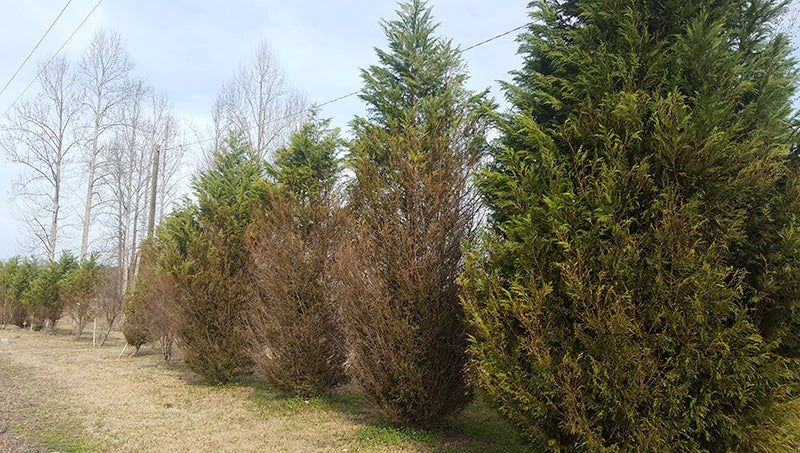My Leyland Cypress is dying from the bottom up — is it going to die?
Published 10:44 am Friday, October 5, 2018

- BLIGHT: Passaflora needle blight is a common disease in Leyland cypress, and ultimately leaves an entire tree devoid of foliage.
Sometimes, I feel like the doctor that comes out from surgery to deliver the bad news in the waiting room … chances are your tree is going to survive, but it may never thrive. Leyland cypress, x Cupressocyparis leylandii (yes, the name has changed), is one of the most popular landscape-screening trees that I come across. As such, they are also one of the trees in which I receive the most trouble calls about.
If you are looking for a great, worry-free, disease/pest resistant privacy screen this is NOT IT in our area. These trees are not well suited for eastern North Carolina, especially areas east of U.S. Highway 17. Our soils are often wet (saturated) and our water table is often high, two conditions that these trees do not tolerate well.
Leylands are susceptible to phytophthora and Armillaria root rots. Phytophthora is typically more of a problem on young trees; Armillaria, however, can be a problem at any stage of growth after one year. Armillaria is very easily distinguished by the white mycelial growth just below the bark at or just below the soil line.
Leylands are very susceptible to a host of diseases. The most prevalent that I have run into between Beaufort, Hyde, Tyrrell and Washington counties is Passalora needle blight. This disease begins to appear on the lower branches near the trunk and spreads towards the tips, working its way up the tree until the entire tree is devoid of foliage. Seridium canker is another disease that is often diagnosed on Leylands. This disease causes a sporadic tip dieback all over the tree. Upon further investigation, cankers, or open scabs oozing sap, can be found on those branches.
Lastly, there are insect pests that affect these trees, the most notable of which is the bagworm. These tiny caterpillars (larvae of moths) hatch from within the bags in May. At this time, they are in the “crawler” stage and as such are most susceptible to insecticide treatments. The caterpillars begin to feed and construct their bag from plant parts. Once the bag is formed, insecticide treatments are no longer a viable option for control. The larvae will pupate into an adult within this bag, mate, and lay between 500 and 1,000 eggs before it dies without ever leaving the bag again. Bagworms can be a serious pest of Leylands, as well as other conifers. Another pest is the spruce spider mite. A good sign of spider mites on any plant is speckling that appears on the leaves, showing a chlorotic or yellow flecking pattern. Natural predators such as lady bugs typically keep these populations in check. However, populations can explode after an insecticide treatment due to loss of predators. When using an insecticide follow the label and make certain what you are using works on the pest you have. One method is to use things that are less harsh on beneficial insects such as the lady bug. Insecticidal soaps or horticultural oils are a better choice to suppress spider mites without harming beneficials.

BENEATH THE SURFACE: White mycelial growth just below the bark at or just below the soil line points to Armillaria.
One of the best practices in horticulture is “Right Plant in the Right Place.” Leyland cypress does not fall into this category very often in eastern NC. If you are looking for a screening or landscape plant, call your local Extension office for information on plants and their culture. NC Cooperative Extension maintains several lists of plants and the North Carolina State University Plant Database is available to help us choose to put the “Right Plant in the Right Place.”
Register for the “What You Need To Know So You Can Grow” educational series taught at the Beaufort Extension Center this October to learn more about Soil, Growing Vegetables, Growing Fruit, Turf Management, Diseases and Pests of Ornamentals. This series will be taught on Thursdays beginning Oct. 4 from 6 p.m. to 8 p.m. The cost is $10 per class; those attending all of the classes will earn the Blacklands Area Friends of Horticulture “HomeGrown” certification and a free gardening guide published by the Extension master gardener volunteers in Beaufort County. To register, contact Sam Bowden at the Beaufort County Extension office by calling at 252-946-0111.
This series answers real questions from eastern North Carolina. If you have a question to submit, please email to Gene Fox at gene_fox@ncsu.edu. Learn more on Facebook at the Blacklands Area Horticulture page or visit the Extension Office located at 155 Airport Road!
Gene Fox is the area agriculture and consumer horticulture agent for Beaufort, Hyde, Tyrrell and Washington counties.





